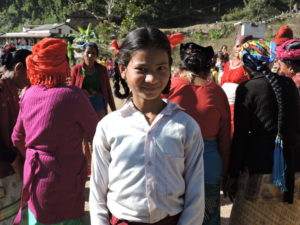World Education works to ensure that all children can claim their right to education. World Education Nepal meets the needs of out-of-school children as a cross-cutting goal threaded throughout projects in a variety of sectors. We prioritize and have expertise with two vulnerable groups in particular: out-of-school girls and children at risk of exploitation from child labor or trafficking.
At-Risk and Marginalized Girls
 In many areas of Nepal, girls impacted by poverty, gender and caste discrimination, and other forms of marginalization, are less likely to enroll or continue in school. As a result, they are more susceptible to child marriage and face reduced livelihood opportunities.
In many areas of Nepal, girls impacted by poverty, gender and caste discrimination, and other forms of marginalization, are less likely to enroll or continue in school. As a result, they are more susceptible to child marriage and face reduced livelihood opportunities.
Over the past decade, World Education has developed and refined its Girls’ Access to Education (GATE) approach, a nine-month non-formal education curriculum that teaches basic literacy, numeracy, and health knowledge. Graduates transition to formal schools at the highest grade level possible, with the support of in-kind scholarships and ongoing monitoring by project participants and staff, which ensures that the girls’ retention and persistence in schools is also supported. Girls who are too old to transition back into the formal school system receive self-employment and small business development coaching so they can develop financial independence and security.
School and Community Mobilization
To complement non-formal education efforts, World Education mobilizes schools and communities to support transition and retention in school. For example, World Education works with local School Management Committees (SMCs) and Parent-Teacher Associations (PTAs) to conduct enrollment campaigns and improve retention, and has also worked with the government of Nepal to conduct a national “Welcome to School” enrollment campaign that over the first five years increased enrollment in school from 4.5 million children to over 7 million children.
Special efforts focus on helping traditional Madrassas become mainstreamed within the national education system. World Education also provides in-kind support to children who need uniforms, stationery, and school bags to reduce financial barriers to education.
